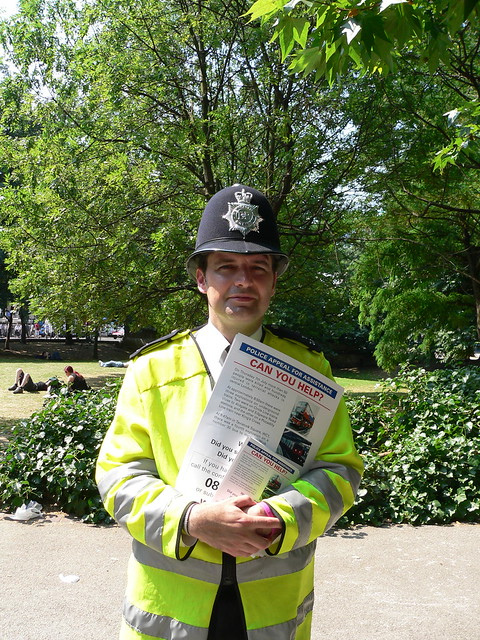Photography, Terrorism and how it’s all changed
I’m an avid photographer. I take a lot of pictures, especially when I’m learning new techniques or have some new equipment to master. This means I take a large number of photos in public places and when on holiday I always seem to have a camera around my neck.
A few years ago, this would have been seen as perfectly acceptable behaviour and I would have been treated as a welcome visitor, bringing in tourist cashy-money. The iconic image of the American Tourist is one of a behawaiianshirted loud man in shorts with an SLR fitted with a 200mm lens round his neck. The iconic image of a Japanese Tourist is that of a polite suited man looking at the world through the lens of a compact camera. Cameras are tourism. Even us Brits when taking our local money to a different town will usually be armed with some sort of digital camera, and let’s not forget we all have camera phones now.
A week after the 2005 London Bombings, I was in London on a holiday we’d booked weeks before. We didn’t consider it a risk or any of that stuff, but we didn’t realise that, as our hotel was at Euston Station, we would be in and around the area it all happened. Walking round Kings Cross and Euston with a camera and I was stopped several times by the police, asking me if I was there the previous week and if I’d taken any pictures. They were all handing out leaflets like this:

The Police were actively seeking the assistance of the public, and quite rightly as anything that can be used to catch people responsible for terror attacks on civilians should be used – as long as it doesn’t interfere basic with human rights, of course. “Did you take any pictures?” was the question I was asked. Unfortunately, I couldn’t be of any help, but tried as best I could to document the atmosphere around that area the week after the attack. I’ve not many posted the photos I took because they were of difficult subjects, like a group of police carrying flowers to a memorial, or of a woman carrying a placard with a list of the dead (almost identical to a BBC photo), or of the crowd gathered outside King’s Cross for the one minute of silence. They weren’t particularly good photos, either. The very first photograph I took on this holiday was actually of the first policeman to ask me if I’d taken any photos; I answered I hadn’t but that I’d like to take his photo. He consented and I took this photo:

Yes, later on on the holiday, I did take photos of ducks on ponds and stuff, as you’re supposed to, but that first day started with my pretending to be a rather poor amateurish photo journalist.
Today, that is different. Abraham Zapruder would be considered a terrorist suspect, John Filo would be considered a terrorist suspect and I would be considered a terrorist suspect, because today, if you take photos of the police, of government buildings or of the many closed-circuit cameras dotted around our British cities, you can be stopped by police, searched and be asked to delete your photos or even be detained for several hours, all of this under the auspices of the Terror Act 2000.
It’s difficult to know how to deal with this, as it’s not like you can argue with the Terror Act without sounding like a dick, and it’s not like you can reason with a pissed-off bobby with over-reaching powers. Being in the right does you no good if you get your camera accidentally broken with no recourse. All we can do is blog about it, which feels hollow and weak, but when all that’s left, expect to see a lot of it.
In the mean time, here are some photos of coppers doing their job, seven days after the bombing, and not hassling photographers.





There is an excellent resource for UK photographers available here: A short guide to photographers rights in the UK.